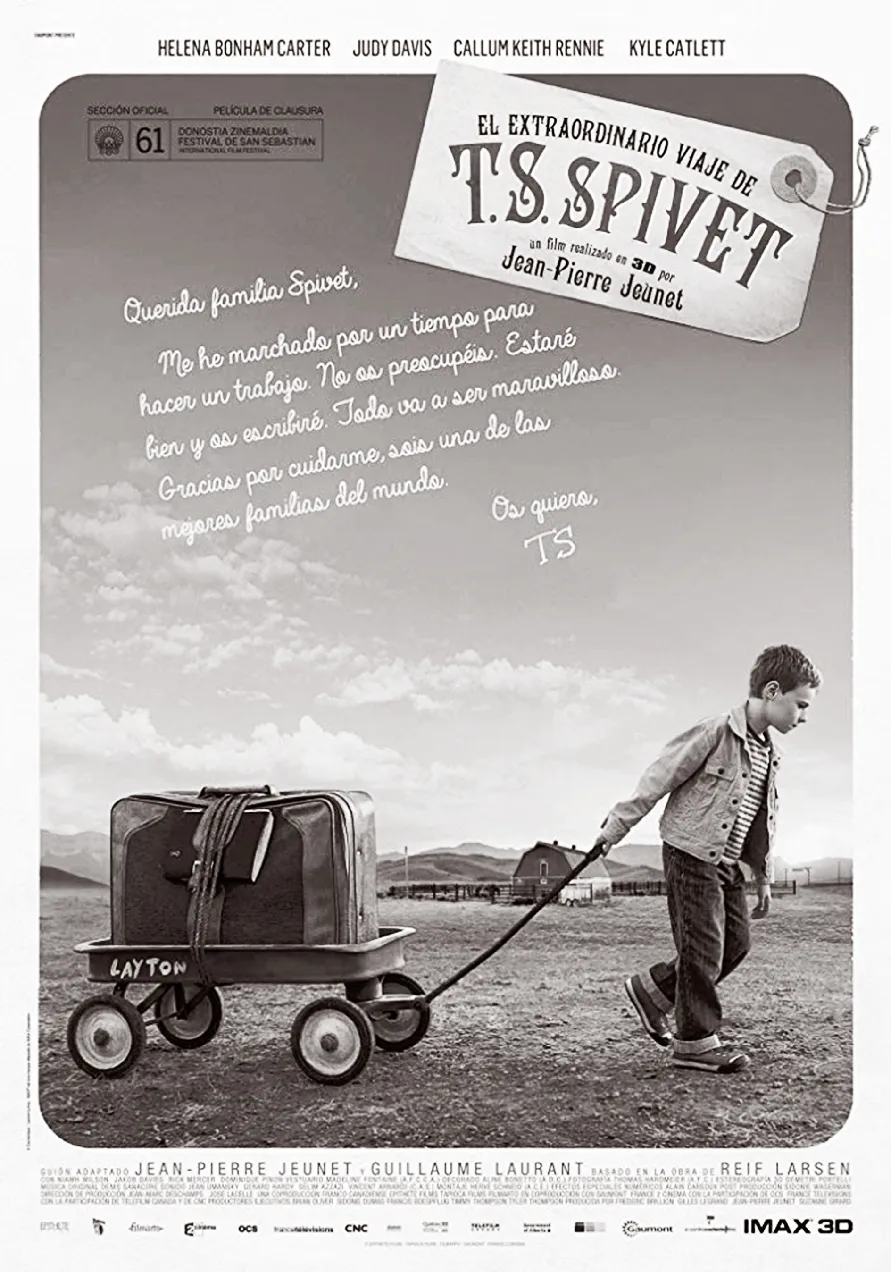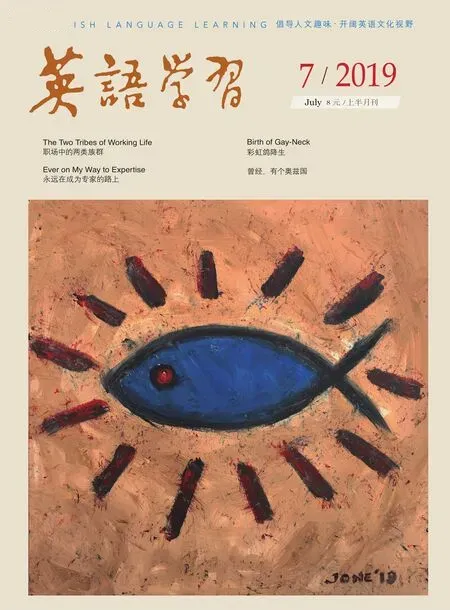《少年斯派维的奇异旅行》
—— 奇思妙想、成长童话和心理分析
2019-07-17宋云峰编写
∷宋云峰 编写
一、电影简介
法国和意大利合拍的《少年斯派维的奇异旅行》(The Young and Prodigious T. S. Spivet, 2013)改编自赖夫·拉森(Reif Larsen)的同名小说,由法国著名导演让-皮埃尔·热内(Jean-Pierre Jeunet)执导。热内以其富含人文精神、奇特想象和唯美画面的文艺片《天使爱美丽》(Amélie, 2001)为人所熟知。这部影片也不例外。除了壮观的美国中西部风光之外(其实外景主要在加拿大拍摄),影片的突出特色是“奇”和“异”——奇特的人物、故事、讲述方式和启示,富有童话和超现实的色彩。热内对电影的热爱及其电影特色均来自欧洲的艺术电影传统。与美国好莱坞电影不同,欧洲电影往往不太考虑电影的娱乐性和商业性,而是专注于导演自己对故事的诠释和展示(主题与风格),在独特性和细节上下功夫。正如热内所言:
“When you are in love with a story, you have to take your time to follow it and to fall in love again one time. You need some time. And I need to be in love with a story because I am going to spend four years of my life inside without pleasure, without seeing anybody, you work 16 hours per day and at the weekend and I need to be in love with each detail.”
由于导演独特的主题与风格,这部电影上映后的反响基本都是积极正面的(positive)。烂番茄网站对影片精美的镜头画面赞赏有加,而另一家大众影评网站Metacritic则评价不高。
The Young and Prodigious T. S. Spivet received generally positive reviews from critics. On Rotten Tomatoes, the f ilm has a rating of 79%, based on 43 reviews, with an average rating of 6/10. The site's critical consensus reads, “The Young And Prodigious T. S. Spivet brings its bestselling source material beautifully to life, offering a blend of visual thrills and poignant pathos (激起同情的因素,伤感力)that help tie the f ilm together despite an occasional surfeit(过量)of quirk(怪异).” On Metacritic, the f ilm holds a score of 53 out of 100, based on 11 reviews, indicating “mixed or average reviews.”
二、故事情节

《少年斯派维的奇异旅行》剧照
少年T. S. 斯派维出生于美国蒙大拿州的一个偏远牧场。虽然年仅十岁,但他却聪明绝顶,酷爱制图学和科学图解。最令人惊奇的是,他发明了无数科学家梦寐以求的永动机,并将图纸寄给了著名的史密森学会。斯派维的父亲是个狂热的牛仔迷,搜集关于西部牛仔的一切;母亲是一位生物学博士,潜心于昆虫研究;而姐姐则是一个再普通不过的正常人,着迷于美国小姐选美大赛,并常常为生在这个一屋子怪人的家庭而烦恼。斯派维原本还有一个异卵双胞胎弟弟莱顿,喜欢动物和射击,但一年前因枪支意外走火而死亡。由于斯派维当时就在现场,他为弟弟的死感到万分内疚,但家里所有人对此事绝口不提。一天,斯派维接到来自史密森学会的电话,告知他因设计永动机而被授予了久负盛名的科学大奖——贝尔德奖,还邀请他到华盛顿参加授奖仪式并发表演讲。于是,十岁的科学奇才斯派维偷偷爬上了货运火车,独自踏上了穿越美国的奇异旅行。完成这次旅行后,斯派维从自己的心理阴影中走了出来,实现了从孩童到少年的转变。
T. S. Spivet is a 10-year-old prodigy(神童)with a passion for cartography(制图学)and scientif ic inventions. He lives on a ranch(牧场)in Montana(蒙大拿州)with his mother who is obsessed with the morphology(形态学)of beetles; his father, a cowboy born a hundred years too late; and his 14-year-old sister who dreams of becoming Miss America. His twin brother Layton died in an accident involving a f irearm(枪支)in the family's barn(谷仓), which no one ever speaks of. T. S. was with him, measuring the scale of the gunshots for an experiment, and he doesn't understand what happened. One day, T. S. receives an unexpected call from the Smithsonian Institute, telling him that he is the winner of the very prestigious Baird Award for his invention of a perpetual motion machine(永动机)and that he is invited to a reception in his honor where he is expected to give a speech. Without telling anyone, he sets out on a freight train(货车)across the United States to reach Washington, D.C.
During his journey, he meets a hobo(流浪汉,无业游民)in the train yards(火车站)of the Midwest, outruns or outwits(智胜)a number of railroad security guards, and then is picked up hitchhiking(搭车)by an 18-wheeler trucker who lets him off at the Smithsonian in Washington. He ultimately gives his speech for the Baird Award to a room full of well-dressed guests, and discusses the death of his brother. After the speech is over, T. S.'s mother and father arrive down in D.C. and interrupt him while he is on a talk show. His mother tells T. S. that it wasn't his fault that Layton got killed, to which the TV interviewer pesters(纠缠,追问)them with further questions up until T. S.'s father punches him and they leave for their home in Montana.
三、电影特色:童话般的奇思妙想、少年成长的烦恼以及微妙的心理分析
1. 超现实的色彩
说起热内,可能很多观众都是从《天使爱美丽》开始熟悉他的。热内在这部电影中将现实世界和诗意的表达结合起来,打造出了一个艳丽的臆想世界(imagined world)。《少年斯派维的奇异旅行》中的斯派维等角色都延续了热内塑造角色的特点,带有超现实主义(surrealism)色彩,给人耳目一新的感觉。这部关于小男孩斯派维的影片并没有着重演绎某一个故事,而是通过一幅幅明亮而美丽的画面来讲述一个荒诞不经但又充满温情的关于爱的故事。超现实主义的表达中最重要的是色彩的运用和处理,力求在真实的基础上最大程度地发挥色彩的表现功能。在这部电影中,热内用了大量饱和度很高的暖色调来构筑一个属于孩子的明丽世界。热内电影中的故事环境并不是一个真实的环境,而是具有童话的色彩。也正是基于此,电影中的荒诞和夸张都演变成了逻辑上的自然。
2. 怪诞的人物
不管是文本表达还是影像表达,人物总是非常重要的,而且导演的创作意图、情感表现都会通过人物的遭遇、行为等来体现。热内将怪诞的人物形象生动地呈现给观众,令人在反常态的强烈震撼和冲击之下获得独特的审美愉悦感,或许这也是热内电影魅力的关键。在这部电影里,小男孩斯派维的家庭成员构成非常怪诞——偏执而头脑简单的母亲,生活在臆想中的19世纪的牛仔父亲,喜欢演戏、梦想参加选美比赛的姐姐,以及酷爱射击、百发百中的双胞胎弟弟。这些人物都带有非常鲜明的个性和特点,构筑了影片整体奇特的基调。
斯派维眼中的家人都是独特甚至怪诞的人:
关于Layton: “Layton's favorite pastimes was shooting anything that moved. My father loved Layton more than anything in the world.”
关于Father: “My father was born a hundred years too late. He has the soul, stature and mindset of a cowboy.”
关于Mother: “Crickets and insects were my mother's specialty. Dr. Claire spent most of her time studying tiny creatures with magnifying glass and classif ied them into species and sub-species.”
关于Parents: “How my parents ever fell for each other was a mystery. They were like day and night.”
3. 少年成长与心理分析的主题
《少年斯派维的奇异旅行》的叙事主要以T. S. 斯派维的视角来观察人际关系和整个世界,通过家庭成员互动与旅行等人生经历,克服丧失同胞弟弟的心理阴影,逐渐形成理性的自我意识,从而实现从懵懂孩童向自我意识清晰的青少年的转变。发明永动机并且到华盛顿的史密森学会领奖只不过是这一切的由头。这部电影的叙事是一个很好的心理分析(psychoanalysis)案例,我们更可以从“符号互动理论”(symbolic interactionism)的角度来分析斯派维的“自我”意识从模糊到清晰的转变过程。不考虑大的社会和时代环境,符号互动理论认为,个人的自我意识和身份的形成是他/她与周围环境(主要是人际关系)互动的结果,在儿童和少年时期尤为重要。该学派的创始人米德(George Herbert Mead)认为,人的自我(self)或者说身份意识(identity)由主体的“我”(I)与客体的“我”(me)共同构成。主体的“我”是指自己对自我的自然认知,而客体的“我”则是指想象中别人眼中的自己,美国社会学家库利(Charles Horton Cooley)将它比喻为“镜像中的自我”(the looking-glass self)。一个人会根据(他/她认为或想象的)别人对他/她的态度及其变化而改变自己的行为。所以,一个人的自我评价和行为很大程度上取决于他/她认为周围的人是如何看待他/她的(即使周围人的看法并不一定如此)。一个人自我意识或身份的形成是两者(I & me)互动的结果。《少年斯派维的奇异旅行》形象地说明了这一点。
The term “the looking-glass self” was created by American sociologist Charles Horton Cooley in 1902, and introduced into his own work Human Nature and the Social Order. It is described as our ref lection of how we think we appear to others. To further explain would be how oneself imagines how others view him/her. According to Lisa McIntyre's The Practical Skeptic: Core Concepts in Sociology, the concept of the “looking-glass self” expresses the tendency for one to understand oneself through the perception which others may hold of them. Essentially, how one views oneself and acts heavily depends on what the individual believes other people think of the individual. This process is theorized to develop one's sense of identity. Therefore identity, or self, is the result of learning to see ourselves through what we perceive to be the perceptions of others.
斯派维认为,同胞弟弟莱顿从精神和气质上继承了父亲的一切,喜爱自然、动物以及射击,而自己对科技的擅长在牧场则派不上任何用场,尤其是父亲对他的发明创造丝毫不感兴趣,更使他认为父亲更喜爱弟弟。所以,当莱顿死于枪支走火事故时,斯派维感到很内疚,认为自己当时在场,没有尽到阻止事故发生的责任。弟弟死后,家人对此绝口不提,更使他认为大家都在心里责怪他:“Layton died last year of a gun accident in the old barn. I don't know what went wrong. I was there too, measuring gun shots. No one ever talked about it. No one.”
走火事故成为斯派维的巨大心理阴影,在整个影片中,莱顿不停地在他的脑海里出现。他黎明前离家出走时,本想搭父亲的车去火车站,但父亲却直接把车开走了,就像没有看见他似的。这让斯派维确信父亲因弟弟的死而怨恨他:“To know that my father had to resort to asking help from me, his only remaining son, the pointless and useless on the ranch, f illed me with sadness.”

《少年斯派维的奇异旅行》电影海报
经过这场奇异的旅行(包括逃脱铁路保安的追逐、与流浪工人相遇、搭货车司机的车、应付史密森学会虚伪的女干事和对付电视媒体主持人的采访等),斯派维对这个复杂的世界有了更多的了解,也认识到主体的自我认知与客观世界之间的差异,从而变得成熟起来。然而,莱顿的死仍然是个巨大的心理阴影,使他快乐不起来。所以,他利用颁奖典礼的致辞说出此事,希望能从阴影中走出来。但是,关键还是父母的原谅和认同。直到母亲告诉他,莱顿死于事故不是他的错,作为母亲让孩子玩枪,自己也未尽到监管责任。父亲也向他说明了那天没让他搭车去火车站的真相——因为当时低头找东西,确实没有看见路边的斯派维。得到父母的原谅后,斯派维终于放下了自己的心理负担,一家人愉快地回到了蒙大拿牧场的家。一切都恢复了正常。
